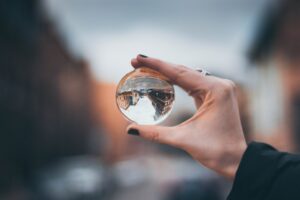Decolonizing the Mind by Learning to Unlearn

An anonymous Medieval poet wrote this:
A moth ate words. It seemed to me
a strange occasion, when I inquired about that wonder,
that the worm swallowed the riddle of certain men,
a thief in the darkness, the glorious pronouncement
and its strong foundation. The stealing guest was not
one whit the wiser, for all those words he swallowed.
Now, reflect: This poem represents a human-centered point of view. Yes, wisdom is being lost, especially true in a time when books were hand-copied. It could be that the moth has eaten pieces of the only copy of a manuscript going back centuries or millennia. The anonymous poet may be correct that a certain wisdom has been lost forever.
And the moth? From the moth’s point of view, the paper and ink that it eats constitute sustenance and survival. Were we capable of communicating with the “worm,” I assume the worm would express that the paper and ink are yummy or yucky or something of the sort. Though, as Ludwig Wittgenstein pointed out, if a lion could speak, we still would not be able to understand the lion. The lion and a human interlocutor would be playing different “language games.” Living in different realities because of the varying metaphors and narratives that we have learned to navigate reality by.
And, come to that, how does the poet—or any of us human beings—know that eating wise words does not make the young moth wiser?
The anonymous poet saw only the loss of words of wisdom from a narrowly human point of view; the moth most likely sensed sustenance alone.
What about the feelings of the book? So far, I have been bio-centric in my consideration. Might the book have something to say about the matter?
I use this example to point out how location and point of view affect what and how we think. Moths and human beings appear to have very different uses for those stacks of paper we fondly call books.
What I have not yet considered is the social and historical location and worldview of the poet who wrote the poem. For me, as a product of Western cultures only nominally exposed to other human points of view, the feeling expressed by the poet makes sense. I, too, have opened old books and found chewed pages. I, too, have felt regret that worms have eaten words.
Yet, is my view the only human view of the situation? It’s certainly not the only available human view of the situation. For example, were I to find a book’s ideology particularly pernicious, I might feel some schadenfreude concerning the book’s partial destruction by insects.
Then there is imagination. I might imagine, for example, that moth larvae are actually robots sent from another star system and pinpointed to acquire specific knowledge from human books. The larvae eat the book, thereby transmitting the knowledge to an alien civilization.
You get the drift. That each of us is the product of a specific time, geographic location, and social location is a given. Yet it is a given that is tough to learn. Some theorists have begun calling the process unlearning. More commonly the process is called decolonizing the mind.
Humanism is arguably a worldview that has evolved within many cultures throughout human history: In China, India, pre-colonial Africa, Persia, Greece, and countless other places and cultures. However, in the United States and other English-speaking nations, we often focus on a continuum that begins in pre-Socratic Greece and traces through to our own post-Christian era. This is as myopic as the moth larvae that I mentioned earlier.
As a concept and worldview, humanism calls us to an understanding that transcends historically Euro-American thinking and the institutions rooted in that thinking. We owe it to ourselves and our planet to open ourselves to a truly multicultural way of living and being.
